Abstract
The introduction of several new antibiotics, including cephalosporins and ureido-penicillins, has been a stimulus for clinical trials with these agents for intra-abdominal infection. Despite marked differences in antibacterial spectra, substantial differences in treatment results have not been documented. We reviewed published trials of antibiotic therapy for intra-abdominal infection to determine factors in study design that might impair identification of clinically important differences between regimens. Sixteen articles were identified that provided sufficient numbers of cases and data for analysis. Eight were prospective comparative trials, the remainder "single-armed" studies. The mortality rate was 3.5%, and the overall success rate was 84% for aminoglycoside plus clindamycin (range 52%-96%), 89% (range 83%-93%) for aminoglycoside plus metronidazole, and 93% (range 61%-95%) for cephalosporin-based regimens. Several defects in study design were identified. (1) Exclusionary criteria employed generally prevented enrollment of seriously ill patients or infections associated with high failure rates: Patients were excluded if even mild renal impairment was present or if antibiotic therapy had been recently administered, thereby excluding patients with postoperative or recurrent infections. Several studies allowed entry of contaminated but not infected patients. (2) Criteria used for reporting infectious diagnosis, premorbid health status, severity of infection, and outcome were nonuniform, and few studies provided such information. (3) Despite the small number of treatment failures, data reported did not allow determination of the basis for failure. For example, only four studies provided information on the operations performed upon treatment failures. Whether treatment failures were due to inadequate antibiotic therapy could therefore not be determined. Enrollment of a variety of low mortality infections precluded demonstration of any differences in regimens. Use of stratified randomization, stratifying for site of infection and severity of infection, and inclusion of greater numbers of patients would increase the likelihood of identifying differences between regimens. Such study design would likely require a multicenter trial to enroll sufficient numbers of cases for statistical analysis.
Full text
PDF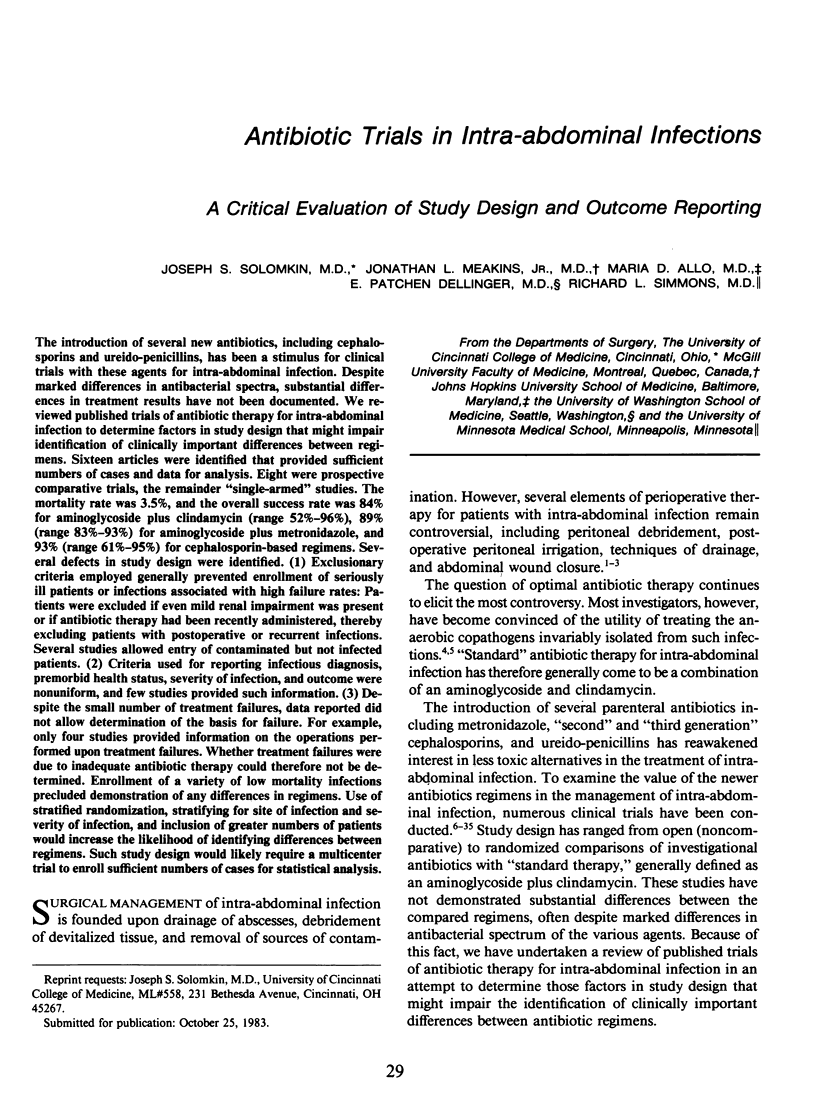
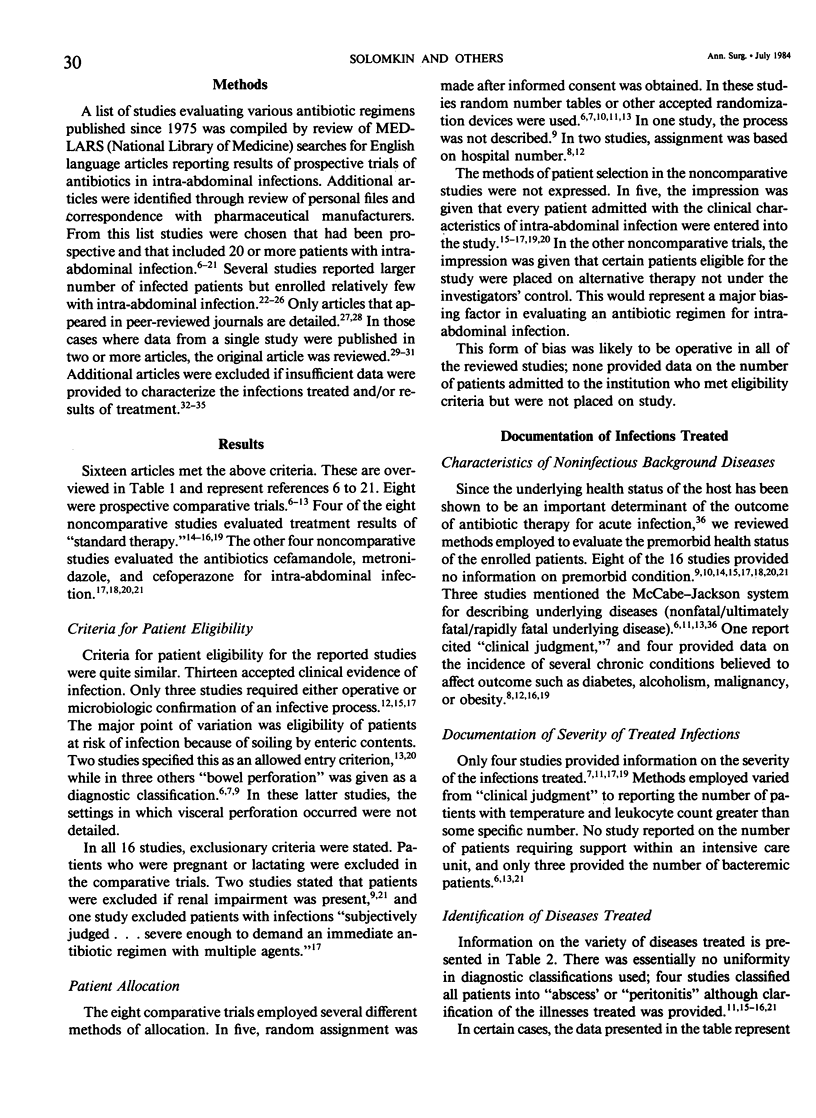
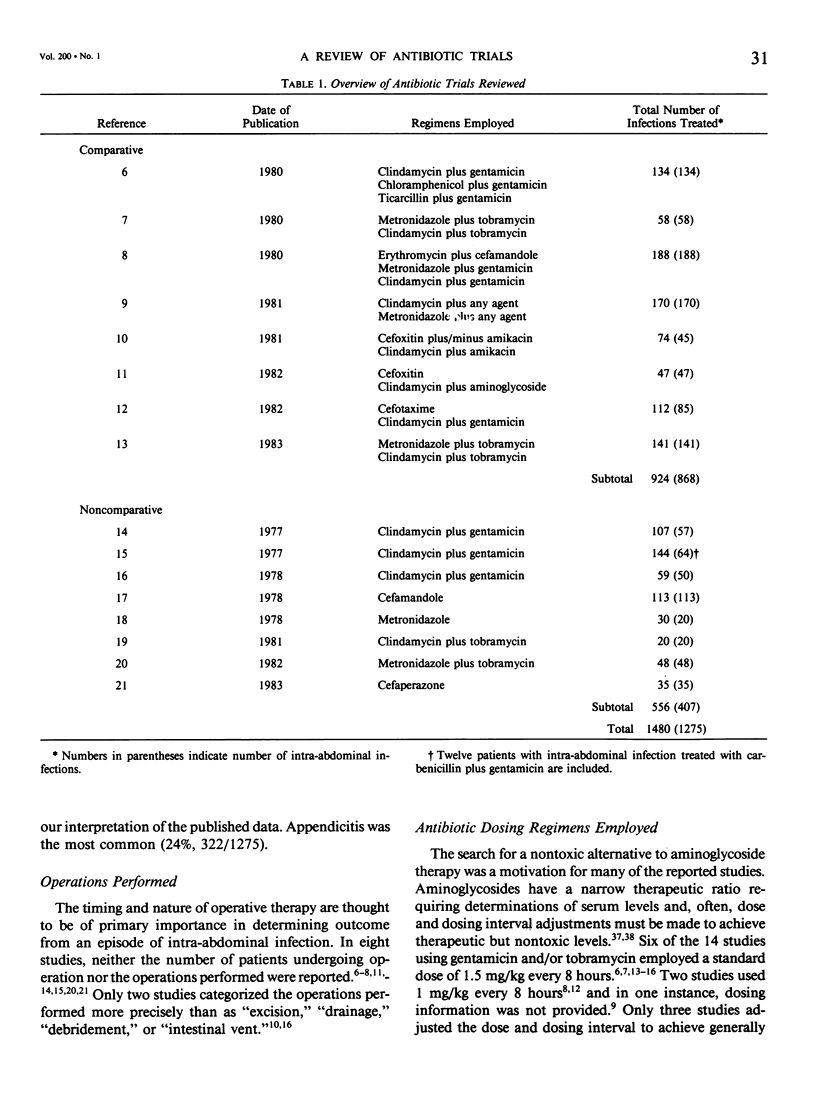
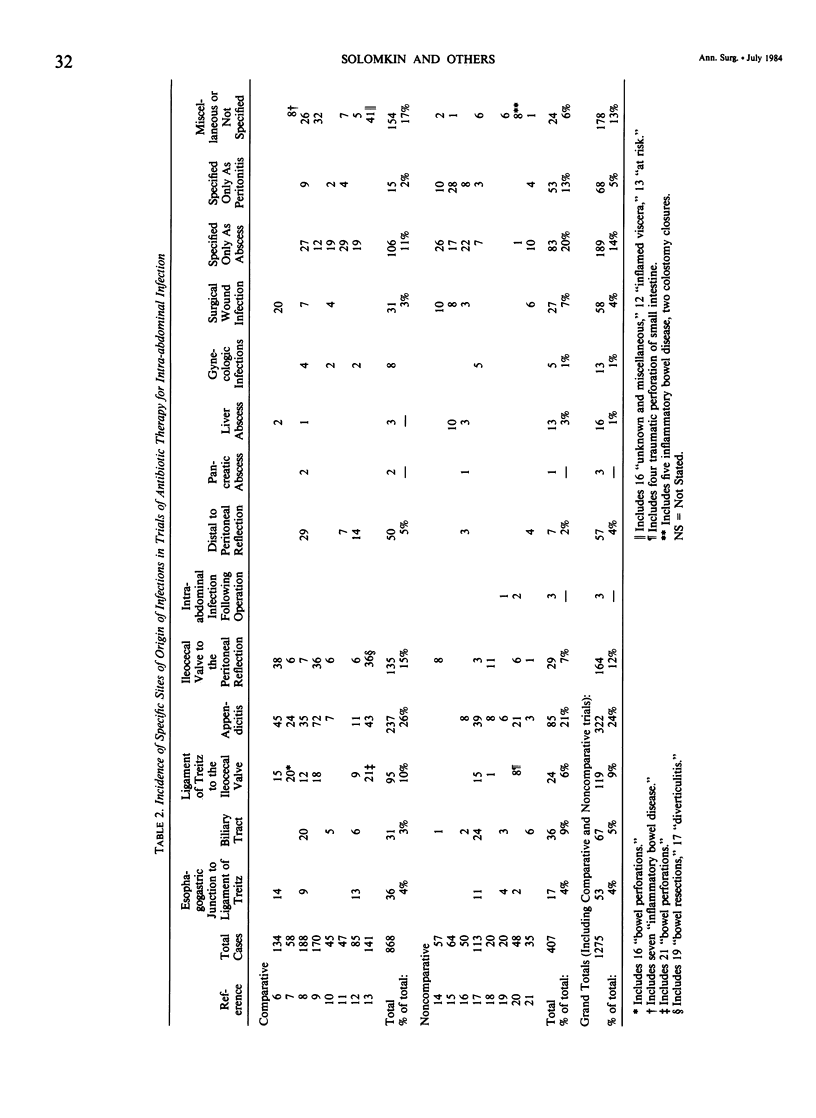
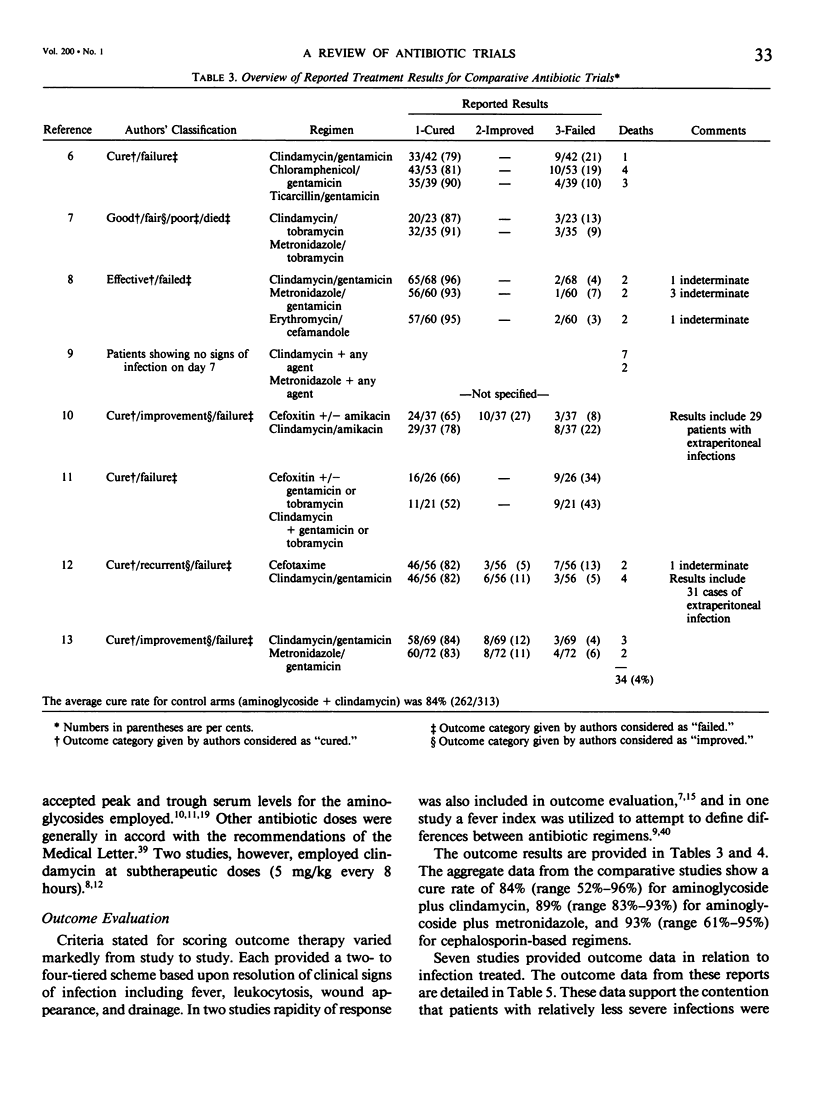
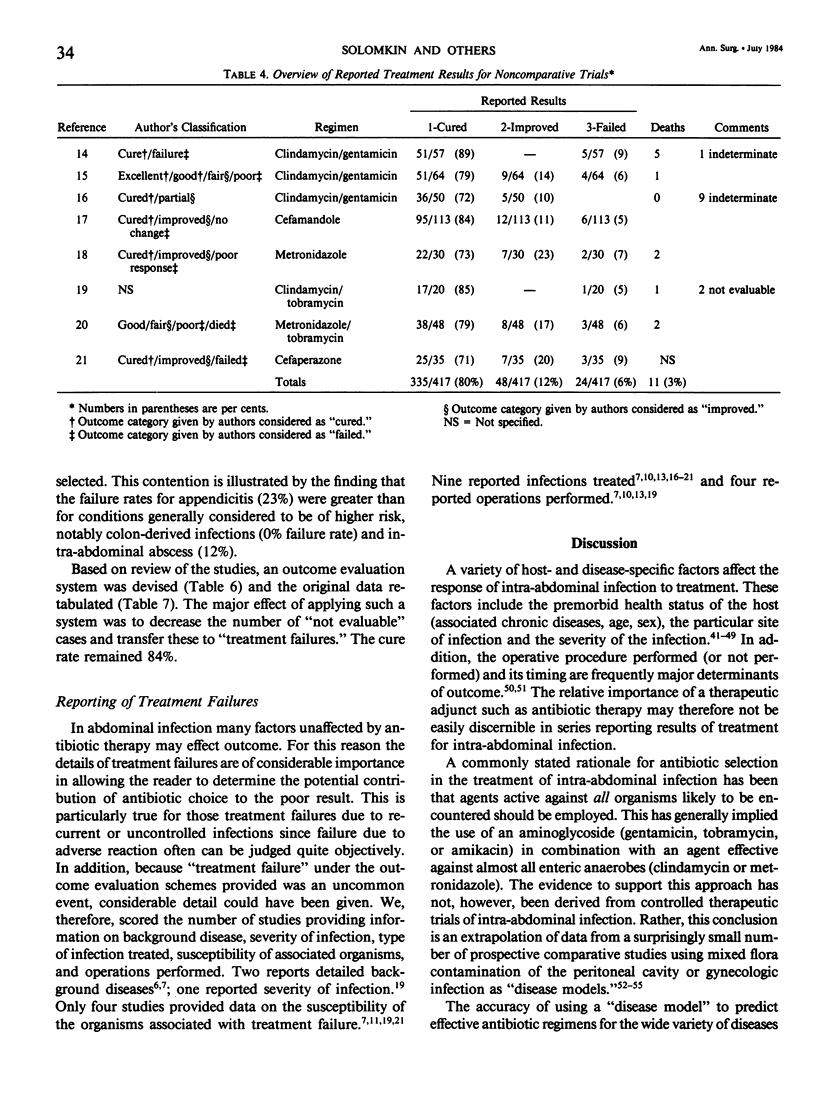
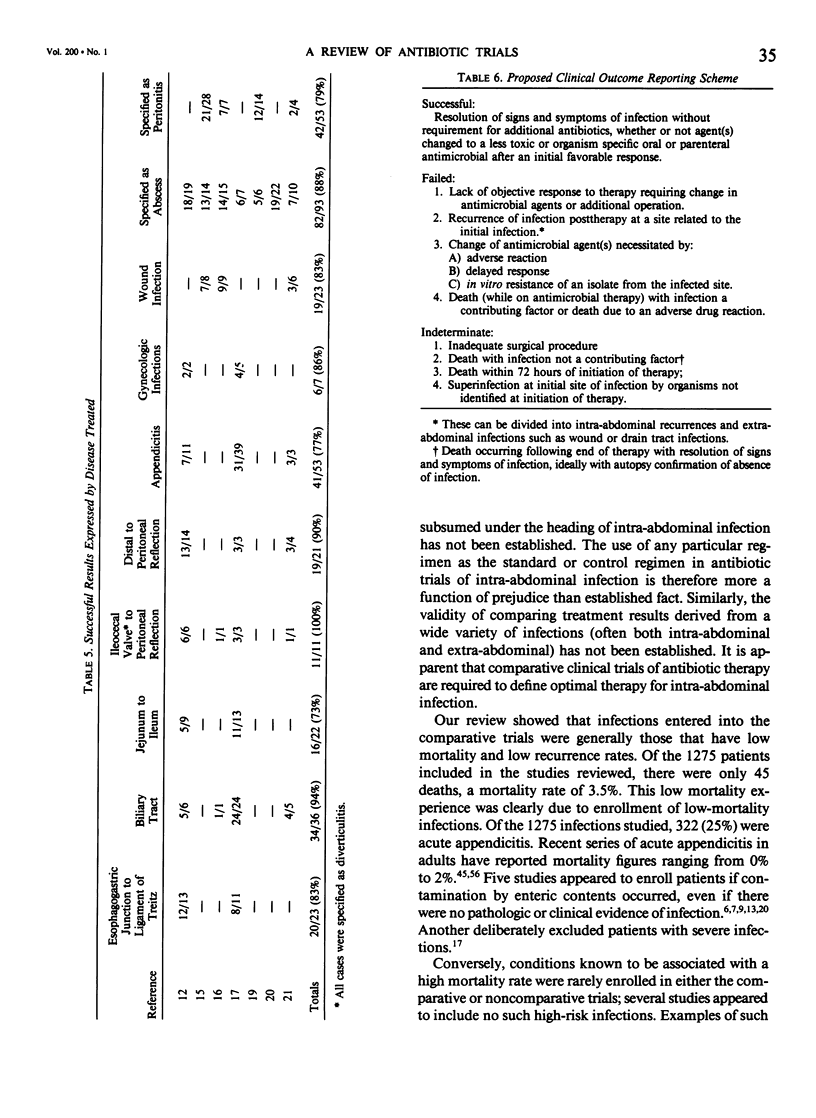
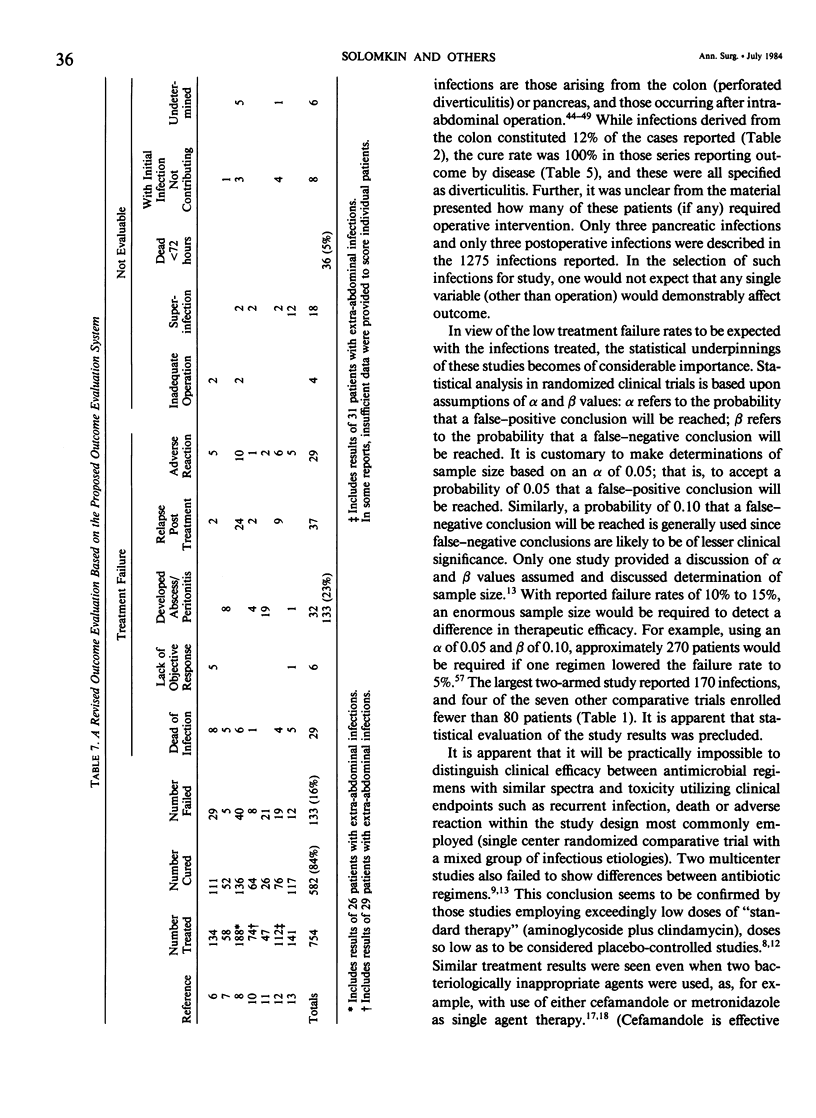
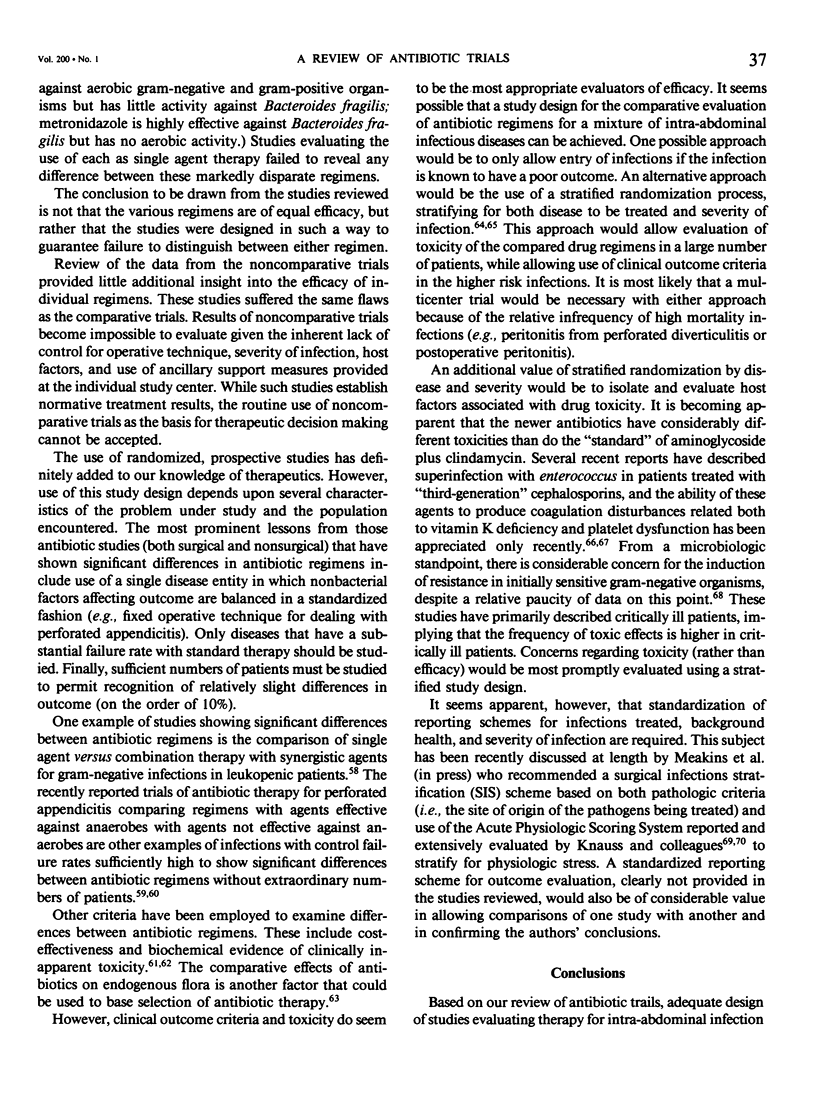
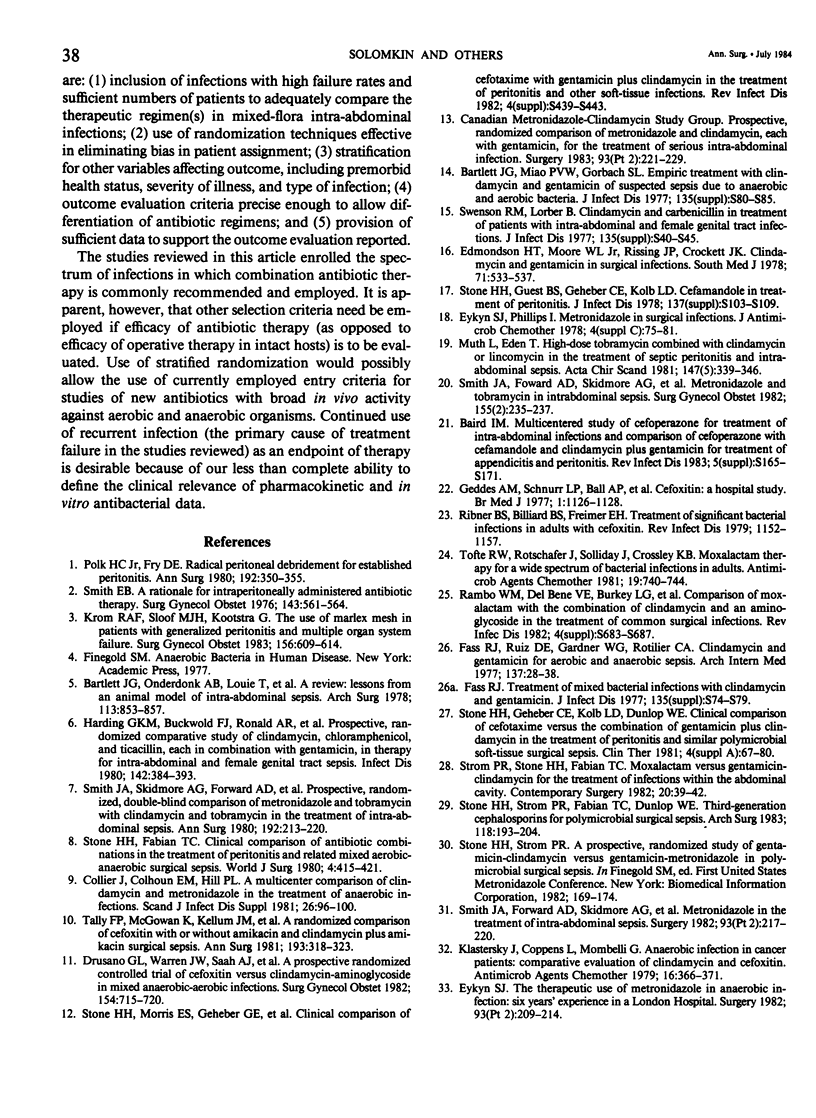
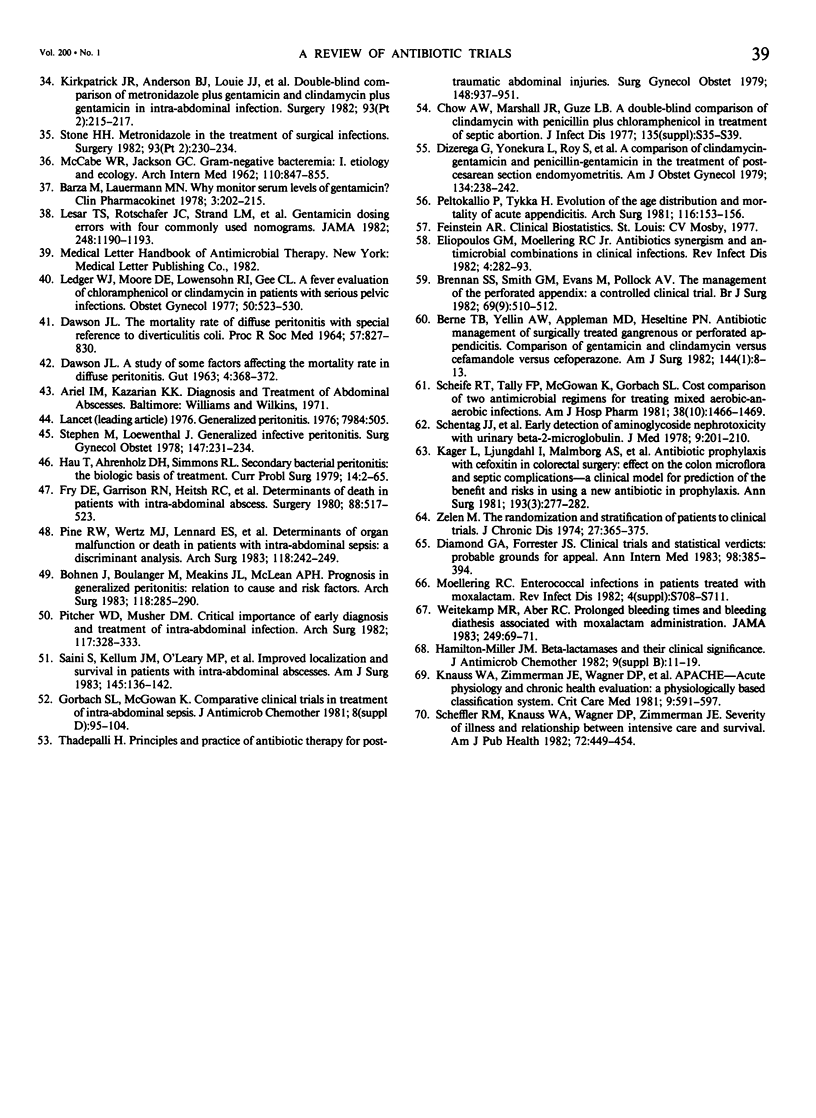
Selected References
These references are in PubMed. This may not be the complete list of references from this article.
- Bartlett J. G., Miao P. V., Gorbach S. L. Empiric treatment with clindamycin and gentamicin of suspected sepsis due to anaerobic and aerobic bacteria. J Infect Dis. 1977 Mar;135 (Suppl):S80–S85. doi: 10.1093/infdis/135.supplement.s80. [DOI] [PubMed] [Google Scholar]
- Bartlett J. G., Onderdonk A. B., Louie T., Kasper D. L., Gorbach S. L. A review. Lessons from an animal model of intra-abdominal sepsis. Arch Surg. 1978 Jul;113(7):853–857. doi: 10.1001/archsurg.1978.01370190075013. [DOI] [PubMed] [Google Scholar]
- Barza M., Lauermann M. Why monitor serum levels of gentamicin? Clin Pharmacokinet. 1978 May-Jun;3(3):202–215. doi: 10.2165/00003088-197803030-00002. [DOI] [PubMed] [Google Scholar]
- Berne T. V., Yellin A. W., Appleman M. D., Heseltine P. N. Antibiotic management of surgically treated gangrenous or perforated appendicitis. Comparison of gentamicin and clindamycin versus cefamandole versus cefoperazone. Am J Surg. 1982 Jul;144(1):8–13. doi: 10.1016/0002-9610(82)90594-3. [DOI] [PubMed] [Google Scholar]
- Bohnen J., Boulanger M., Meakins J. L., McLean A. P. Prognosis in generalized peritonitis. Relation to cause and risk factors. Arch Surg. 1983 Mar;118(3):285–290. doi: 10.1001/archsurg.1983.01390030017003. [DOI] [PubMed] [Google Scholar]
- Brennan S. S., Smith G. M., Evans M., Pollock A. V. The management of the perforated appendix: a controlled clinical trial. Br J Surg. 1982 Sep;69(9):510–512. doi: 10.1002/bjs.1800690905. [DOI] [PubMed] [Google Scholar]
- Chow A. W., Marshall J. R., Guze L. B. A double-blind comparison of clindamycin with penicillin plus chloramphenicol in treatment of septic abortion. J Infect Dis. 1977 Mar;135 (Suppl):S35–S39. doi: 10.1093/infdis/135.supplement.s35. [DOI] [PubMed] [Google Scholar]
- Collier J., Colhoun E. M., Hill P. L. A multicentre comparison of clindamycin and metronidazole in the treatment of anaerobic infections. Scand J Infect Dis Suppl. 1981;26:96–100. [PubMed] [Google Scholar]
- DAWSON J. L. A STUDY OF SOME FACTORS AFFECTING THE MORTALITY RATE IN DIFFUSE PERITONITIS. Gut. 1963 Dec;4:368–372. doi: 10.1136/gut.4.4.368. [DOI] [PMC free article] [PubMed] [Google Scholar]
- DAWSON J. L. THE MORTALITY RATE OF DIFFUSE PERITONITIS WITH SPECIAL REFERENCE TO DIVERTICULITIS COLI. Proc R Soc Med. 1964 Sep;57:827–830. [PMC free article] [PubMed] [Google Scholar]
- Diamond G. A., Forrester J. S. Clinical trials and statistical verdicts: probable grounds for appeal. Ann Intern Med. 1983 Mar;98(3):385–394. doi: 10.7326/0003-4819-98-3-385. [DOI] [PubMed] [Google Scholar]
- Drusano G. L., Warren J. W., Saah A. J., Caplan E. S., Tenney J. H., Hansen S., Granados J., Standiford H. C., Miller E. H., Jr A prospective randomized controlled trial of cefoxitin versus clindamycin-aminoglycoside in mixed anaerobic-aerobic infections. Surg Gynecol Obstet. 1982 May;154(5):715–720. [PubMed] [Google Scholar]
- Edmondson H. T., Moore W. L., Jr, Rissing J. P., Crockett J. K. Clindamycin and gentamicin in surgical infections. South Med J. 1978 May;71(5):533–537. doi: 10.1097/00007611-197805000-00016. [DOI] [PubMed] [Google Scholar]
- Eliopoulos G. M., Moellering R. C., Jr Antibiotic synergism and antimicrobial combinations in clinical infections. Rev Infect Dis. 1982 Mar-Apr;4(2):282–293. doi: 10.1093/clinids/4.2.282. [DOI] [PubMed] [Google Scholar]
- Eykyn S. J., Phillips I. Metronidazole in surgical infections. J Antimicrob Chemother. 1978 Sep;4 (Suppl 100):75–81. doi: 10.1093/jac/4.suppl_c.75. [DOI] [PubMed] [Google Scholar]
- Eykyn S. J. The therapeutic use of metronidazole in anaerobic infection: six years' experience in a London hospital. Surgery. 1983 Jan;93(1 Pt 2):209–214. [PubMed] [Google Scholar]
- Fass R. J., Ruiz D. E., Gardner W. G., Rotilie C. A. Clindamycin and gentamicin for aerobic and anaerobic sepsis. Arch Intern Med. 1977 Jan;137(1):28–38. [PubMed] [Google Scholar]
- Fass R. J. Treatment of mixed bacterial infections with clindamycin and gentamicin. J Infect Dis. 1977 Mar;135 (Suppl):S74–S79. doi: 10.1093/infdis/135.supplement.s74. [DOI] [PubMed] [Google Scholar]
- Fry D. E., Garrison R. N., Heitsch R. C., Calhoun K., Polk H. C., Jr Determinants of death in patients with intraabdominal abscess. Surgery. 1980 Oct;88(4):517–523. [PubMed] [Google Scholar]
- Geddes A. M., Schnurr L. P., Ball A. P., McGhie D., Brookes G. R., Wise R., Andrews J. Cefoxitin: a hospital study. Br Med J. 1977 Apr 30;1(6069):1126–1128. doi: 10.1136/bmj.1.6069.1126. [DOI] [PMC free article] [PubMed] [Google Scholar]
- Gorbach S. L., McGowan K. Comparative clinical trials in treatment of intra-abdominal sepsis. J Antimicrob Chemother. 1981 Dec;8 (Suppl 500):95–104. doi: 10.1093/jac/8.suppl_d.95. [DOI] [PubMed] [Google Scholar]
- Hamilton-Miller J. M. beta-Lactamases and their clinical significance. J Antimicrob Chemother. 1982 Feb;9 (Suppl B):11–19. doi: 10.1093/jac/9.suppl_b.11. [DOI] [PubMed] [Google Scholar]
- Harding G. K., Buckwold F. J., Ronald A. R., Marrie T. J., Brunton S., Koss J. C., Gurwith M. J., Albritton W. L. Prospective, randomized comparative study of clindamycin, chloramphenicol, and ticarcillin, each in combination with gentamicin, in therapy for intraabdominal and female genital tract sepsis. J Infect Dis. 1980 Sep;142(3):384–393. doi: 10.1093/infdis/142.3.384. [DOI] [PubMed] [Google Scholar]
- Hau T., Ahrenholz D. H., Simmons R. L. Secondary bacterial peritonitis: the biologic basis of treatment. Curr Probl Surg. 1979 Oct;16(10):1–65. doi: 10.1016/s0011-3840(79)80011-8. [DOI] [PubMed] [Google Scholar]
- Kager L., Ljungdahl I., Malmborg A. S., Nord C. E., Pieper R., Dahlgren P. Antibiotic prophylaxis with cefoxitin in colorectal surgery: effect on the colon microflora and septic complications--a clinical model for prediction of the benefit and risks in using a new antibiotic in prophylaxis. Ann Surg. 1981 Mar;193(3):277–282. doi: 10.1097/00000658-198103000-00005. [DOI] [PMC free article] [PubMed] [Google Scholar]
- Kirkpatrick J. R., Anderson B. J., Louie J. J., Stiver H. G. Double-blind comparison of metronidazole plus gentamicin and clindamycin plus gentamicin in intra-abdominal infection. Surgery. 1983 Jan;93(1 Pt 2):215–216. [PubMed] [Google Scholar]
- Klastersky J., Coppens L., Mombelli G. Anaerobic infection in cancer patients: comparative evaluation of clindamycin and cefoxitin. Antimicrob Agents Chemother. 1979 Sep;16(3):366–371. doi: 10.1128/aac.16.3.366. [DOI] [PMC free article] [PubMed] [Google Scholar]
- Knaus W. A., Zimmerman J. E., Wagner D. P., Draper E. A., Lawrence D. E. APACHE-acute physiology and chronic health evaluation: a physiologically based classification system. Crit Care Med. 1981 Aug;9(8):591–597. doi: 10.1097/00003246-198108000-00008. [DOI] [PubMed] [Google Scholar]
- Ledger W. J., Moore D. E., Lowensohn R. I., Gee C. L. A fever index evaluation of chloramphenicol or clindamycin in patients with serious pelvic infections. Obstet Gynecol. 1977 Nov;50(5):523–530. [PubMed] [Google Scholar]
- Lesar T. S., Rotschafer J. C., Strand L. M., Solem L. D., Zaske D. E. Gentamicin dosing errors with four commonly used nomograms. JAMA. 1982 Sep 10;248(10):1190–1193. [PubMed] [Google Scholar]
- Moellering R. C., Jr Enterococcal infections in patients treated with moxalactam. Rev Infect Dis. 1982 Nov-Dec;4 (Suppl):S708–S711. doi: 10.1093/clinids/4.supplement_3.s708. [DOI] [PubMed] [Google Scholar]
- Muth L., Edén T. High-dose tobramycin combined with clindamycin or lincomycin in the treatment of septic peritonitis and intraabdominal sepsis. Acta Chir Scand. 1981;147(5):339–346. [PubMed] [Google Scholar]
- Peltokallio P., Tykkä H. Evolution of the age distribution and mortality of acute appendicitis. Arch Surg. 1981 Feb;116(2):153–156. doi: 10.1001/archsurg.1981.01380140015003. [DOI] [PubMed] [Google Scholar]
- Pine R. W., Wertz M. J., Lennard E. S., Dellinger E. P., Carrico C. J., Minshew B. H. Determinants of organ malfunction or death in patients with intra-abdominal sepsis. A discriminant analysis. Arch Surg. 1983 Feb;118(2):242–249. doi: 10.1001/archsurg.1983.01390020084014. [DOI] [PubMed] [Google Scholar]
- Pitcher W. D., Musher D. M. Critical importance of early diagnosis and treatment of intra-abdominal infection. Arch Surg. 1982 Mar;117(3):328–333. doi: 10.1001/archsurg.1982.01380270046010. [DOI] [PubMed] [Google Scholar]
- Polk H. C., Jr, Fry D. E. Radical peritoneal debridement for established peritonitis. The results of a prospective randomized clinical trial. Ann Surg. 1980 Sep;192(3):350–355. doi: 10.1097/00000658-198009000-00010. [DOI] [PMC free article] [PubMed] [Google Scholar]
- Rambo W. M., Del Bene V. E., Burkey L. G., Collins C. D., Richmond D. K. Comparison of moxalactam with the combination of clindamycin and an aminoglycoside in the treatment of common surgical infections. Rev Infect Dis. 1982 Nov-Dec;4 (Suppl):S683–S687. [PubMed] [Google Scholar]
- Saini S., Kellum J. M., O'Leary M. P., O'Donnell T. F., Tally F. P., Carter B., Deterling R. A., Curtis L. E. Improved localization and survival in patients with intraabdominal abscesses. Am J Surg. 1983 Jan;145(1):136–142. doi: 10.1016/0002-9610(83)90180-0. [DOI] [PubMed] [Google Scholar]
- Scheffler R. M., Knaus W. A., Wagner D. P., Zimmerman J. E. Severity of illness and the relationship between intensive care and survival. Am J Public Health. 1982 May;72(5):449–454. doi: 10.2105/ajph.72.5.449. [DOI] [PMC free article] [PubMed] [Google Scholar]
- Scheife R. T., Tally F. P., McGowan K., Gorbach S. L. Cost comparison of two antimicrobial regimens for treating mixed aerobic-anaerobic infections. Am J Hosp Pharm. 1981 Oct;38(10):1466–1469. [PubMed] [Google Scholar]
- Schentag J. J., Sutfin T. A., Plaut M. E., Jusko W. J. Early detection of aminoglycoside nephrotoxicity with urinary beta-2-microglobulin. J Med. 1978;9(3):201–210. [PubMed] [Google Scholar]
- Smith E. B. A rationale for intraperitoneally administered antibiotic therapy. Surg Gynecol Obstet. 1976 Oct;143(4):561–564. [PubMed] [Google Scholar]
- Smith J. A., Forward A. D., Skidmore A. G., Bell G. A., Murphy J. M. Metronidazole and tobramycin in intra-abdominal sepsis. Surg Gynecol Obstet. 1982 Aug;155(2):235–237. [PubMed] [Google Scholar]
- Smith J. A., Forward A. D., Skidmore A. G., Bell G. A., Murphy J. M., Sutherland E. Metronidazole in the treatment of intra-abdominal sepsis. Surgery. 1983 Jan;93(1 Pt 2):217–220. [PubMed] [Google Scholar]
- Smith J. A., Skidmore A. G., Forward A. D., Clarke A. M., Sutherland E. Prospective, randomized, double-blind comparison of metronidazole and tobramycin with clindamycin and tobramycin in the treatment of intra-abdominal sepsis. Ann Surg. 1980 Aug;192(2):213–220. doi: 10.1097/00000658-198008000-00015. [DOI] [PMC free article] [PubMed] [Google Scholar]
- Stephen M., Loewenthal J. Generalized infective peritonitis. Surg Gynecol Obstet. 1978 Aug;147(2):231–234. [PubMed] [Google Scholar]
- Stone H. H., Fabian T. C. Clinical comparison of antibiotic combinations in the treatment of peritonitis and related mixed aerobic-anaerobic surgical sepsis. World J Surg. 1980 Jul;4(4):415–421. doi: 10.1007/BF02393162. [DOI] [PubMed] [Google Scholar]
- Stone H. H., Geheber C. E., Kolb L. D., Dunlop W. E. Clinical comparison of cefotaxime versus the combination of gentamicin plus clindamycin in the treatment of peritonitis and similar polymicrobial soft-tissue surgical sepsis. Clin Ther. 1981;4 (Suppl A):67–80. [PubMed] [Google Scholar]
- Stone H. H., Guest B. S., Geheber C. E., Kolb L. D. Cefamandole in treatment of peritonitis. J Infect Dis. 1978 May;137 (Suppl):S103–S109. doi: 10.1093/infdis/137.supplement.s103. [DOI] [PubMed] [Google Scholar]
- Stone H. H. Metronidazole in the treatment of surgical infections. Surgery. 1983 Jan;93(1 Pt 2):230–234. [PubMed] [Google Scholar]
- Stone H. H., Morris E. S., Geheber C. E., Kolb L. D., Dunlop W. E. Clinical comparison of cefotaxime with gentamicin plus clindamycin in the treatment of peritonitis and other soft-tissue infections. Rev Infect Dis. 1982 Sep-Oct;4 (Suppl):S439–S443. doi: 10.1093/clinids/4.supplement_2.s439. [DOI] [PubMed] [Google Scholar]
- Stone H. H., Strom P. R., Fabian T. C., Dunlop W. E. Third-generation cephalosporins for polymicrobial surgical sepsis. Arch Surg. 1983 Feb;118(2):193–200. doi: 10.1001/archsurg.1983.01390020047009. [DOI] [PubMed] [Google Scholar]
- Swenson R. M., Lorber B. Clindamycin and Carbenicillin in treatment of patients with intraabdominal and female genital tract infections. J Infect Dis. 1977 Mar;135 (Suppl):S40–S45. doi: 10.1093/infdis/135.supplement.s40. [DOI] [PubMed] [Google Scholar]
- Tally F. P., McGowan K., Kellum J. M., Gorbach S. L., O'Donnell T. F. A randomized comparison of cefoxitin with or without amikacin and clindamycin plus amikacin in surgical sepsis. Ann Surg. 1981 Mar;193(3):318–323. doi: 10.1097/00000658-198103000-00011. [DOI] [PMC free article] [PubMed] [Google Scholar]
- Thadepalli H. Principles and practice of antibiotic therapy for post-traumatic abdominal injuries. Surg Gynecol Obstet. 1979 Jun;148(6):937–951. [PubMed] [Google Scholar]
- Tofte R. W., Rotschafer J., Solliday J., Crossley K. B. Moxalactam therapy for a wide spectrum of bacterial infections in adults. Antimicrob Agents Chemother. 1981 May;19(5):740–744. doi: 10.1128/aac.19.5.740. [DOI] [PMC free article] [PubMed] [Google Scholar]
- Weitekamp M. R., Aber R. C. Prolonged bleeding times and bleeding diathesis associated with moxalactam administration. JAMA. 1983 Jan 7;249(1):69–71. [PubMed] [Google Scholar]
- Wouters D. B., Krom R. A., Slooff M. J., Kootstra G., Kuijjer P. J. The use of Marlex mesh in patients with generalized peritonitis and multiple organ system failure. Surg Gynecol Obstet. 1983 May;156(5):609–614. [PubMed] [Google Scholar]
- Zelen M. The randomization and stratification of patients to clinical trials. J Chronic Dis. 1974 Sep;27(7-8):365–375. doi: 10.1016/0021-9681(74)90015-0. [DOI] [PubMed] [Google Scholar]
- diZerega G., Yonekura L., Roy S., Nakamura R. M., Ledger W. J. A comparison of clindamycin-gentamicin and penicillin-gentamicin in the treatment of post-cesarean section endomyometritis. Am J Obstet Gynecol. 1979 Jun 1;134(3):238–242. doi: 10.1016/s0002-9378(16)33026-5. [DOI] [PubMed] [Google Scholar]


